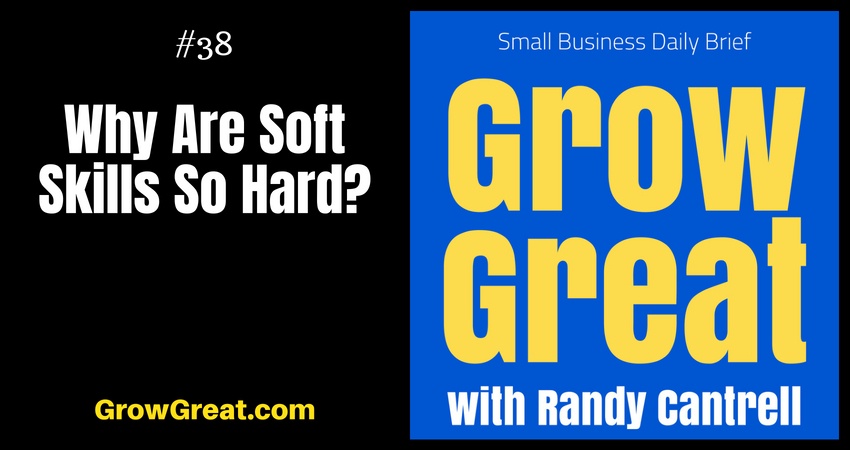Podcast: Play in new window | Download (Duration: 6:30 — 6.5MB)
Subscribe: Apple Podcasts | Spotify | RSS | More

Two interconnected topics have been the focal point of most of my conversations – culture and leadership.
People, communication, emotional intelligence. These are at the heart of “soft skills.”
I was speaking with a young leader about some of his challenges. After half an hour or so he blurted out, “I don’t know they’re called ‘soft’ ’cause they’re anything, but.”
Soft skills are hard because the focus is people. Namely, OTHER people. And for quite a few folks, other people are difficult.
There’s an awful lot of conversation today about the multi-generational workplace and the impact it’s having on culture. In many organizations, there are people in their 20’s, 30’s, 40’s, 50’s and 60’s. Just think about the difference in the world in 1950 versus 2000. That’s 50 years, but arguably the most disruptive, technologically advanced span of time in human history. It has an impact because each generation has a point of view. That’s always been true, but the technological advancements of recent years have likely widened the gap even more.
Heart is at the heart of soft skills. Empathy is seeking understanding or actual understanding. It’s a focus on others. There are no technological advancements required. Or even allowed. People are people.
Personality fuels our behavior. Much of it is innate, it’s simply who we are. Some of it is experiential or our environment and surrounding.
It begins in our heart. And how determined we are, how curious we are to really understand others. Without it, softs skills aren’t just hard…they’re impossible. Situational recognition – the ability to read people in a variety of circumstances – doesn’t exist in equal measure to all of us. That doesn’t mean it can’t be improved upon.
The major reason soft skills are so hard is because selfishness is so easy. We’re prone toward self-interest. It’s manifested in casual conversation where we’re not listening to the other person because we’re busy rehearsing in our head what we want to say next. It’s manifested in our desire to make sure we’re in the most favorable position possible. 27/7/365 we’re living with ourselves, wanting what we want. It’s about us.
Another reason soft skills are so hard is because we get better reading people and situations with repeated experiences. The more we see something, or hear it, or have to deal with it…the more we figure it out. But in a business environment, we’re often experiencing things for the first time. Situations we’ve never seen before. These co-workers are brand new to us. The people and the circumstances are all unique. Until we’ve seen them and experienced them, we’re often unsure of how to make sense of them. Or read them accurately.
But today’s show title – Why are soft skills so hard? – isn’t the real point. The main point is how we can improve them, and make them less hard.
I’ve just given you two reasons why they’re hard: 1) selfishness is so easy and 2) inexperience precedes experience. One of my favorite quotes hits that second one in strong fashion…
Everything is hard until it’s easy.
Here are just 2 things everybody can do to improve their soft skills.
One, focus on the other person or people. There are some crucial elements to help us do this effectively. First, incorporate grace. Be willing to extend grace to others. Consider conversations and points of view not as right or wrong, but simply as perspectives worthy of being understood. Next, incorporate gratitude. Be grateful for your blessings. Be grateful to experience other people and the situations you’re in. Then, incorporate patience. Listen to understand instead of listening to respond, or argue. Observe to understand instead of judging to condemn, or to fix.
Two, bring value to people, not your cause. When our concentration is on how we can bring greater value to our organization and those in it, we’re nudged to put people in their proper order. First.
Think of the people who have been most valuable to you. They weren’t people bent on an agenda, willing to ride roughshod over your ideas or feelings. They were interested in helping you become better. Maybe it was manifested in teaching you something. Or correcting something they saw that was hurting you. You were the focal point of their service. You knew it. If you’ll bring value to people and make sure that’s your honest intention, it’ll change your approach (and your words, too).
It’s a vast topic. I hope as we begin this new week I’ve provoked you to consider how you can make yourself more expert in soft skills. If you’ll put in the work and achieve greater competence in the soft skills, you’ll make yourself invaluable. Companies, organizations and entire nations are desperately needing people who can contribute to making a culture great.
Be well. Do good. Grow great!

Listen to the podcast
 About the hosts: Randy Cantrell brings over 4 decades of experience as a business leader and organization builder. Lisa Norris brings almost 3 decades of experience in HR and all things "people." Their shared passion for leadership and developing high-performing cultures provoked them to focus the Grow Great podcast on city government leadership.
About the hosts: Randy Cantrell brings over 4 decades of experience as a business leader and organization builder. Lisa Norris brings almost 3 decades of experience in HR and all things "people." Their shared passion for leadership and developing high-performing cultures provoked them to focus the Grow Great podcast on city government leadership.
The work is about achieving unprecedented success through accelerated learning in helping leaders and executives "figure it out."

